News
State Department defends US ambassador to Zambia
Daniel Foote asked to leave country over defense of gay couple
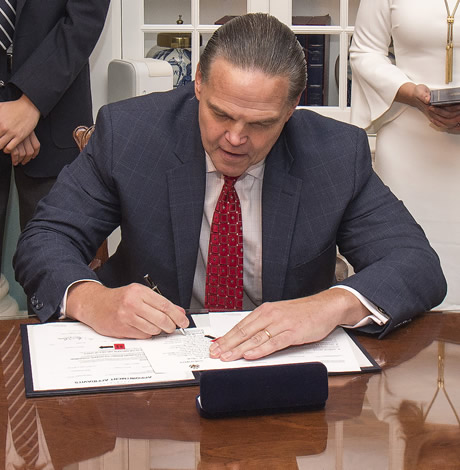

The State Department on Thursday defended U.S. Ambassador to Zambia Daniel Foote after the country’s president said he should leave over his defense of a gay couple sentenced to 15 years in prison under a colonial-era sodomy law.
Media reports indicate Edgar Lungu on Sunday told ZNBC TV, a government-owned television station, his administration has “complained officially to the American government.”
“We are waiting for their response because we don’t want such people in our midst,” said Lungu, referring to Foote. “We want him gone.”
Foote late last month publicly criticized the sentencing of the two men who were convicted of “crimes against the order of nature.” Foote later said “threats made against me” prompted him to not attend World AIDS Day events.
“We are dismayed by the Zambian government’s statement that Ambassador Foote’s position ‘is no longer tenable,’ which we consider to be the equivalent of a declaration that the ambassador is persona non grata,” a State Department official told the Los Angeles Blade in a statement. “Despite this action, the United States remains committed to our partnership with the Zambian people.”
“We seek an open and frank relationship of mutual respect, commensurate with the generous aid provided to the Zambian people by the United States,” added the official.
Zambia is among the dozens of countries in which consensual same-sex sexual relations remain criminalized. The Trump administration earlier this year announced U.S. Ambassador to Germany Richard Grenell would lead an initiative that encourages nations to decriminalize homosexuality.
“The Department of State works tirelessly to protect and promote the human rights and fundamental freedoms of all human beings around the world, regardless of gender, religious belief, national origin, sexual orientation, or economic circumstance,” said the State Department official. “The United States firmly opposes abuses against LGBTI persons. Governments have an obligation to ensure that all people can freely enjoy the universal human rights and fundamental freedoms to which they are entitled.”
Former U.S. Ambassador to the Dominican Republic James “Wally” Brewster on Thursday told the Blade that Foote was his “number two” when he represented the U.S. in Santo Domingo. Brewster, who was one of the openly gay U.S. ambassadors under the Obama administration, also noted Foote was in Haiti “immediately” after the 2010 earthquake that killed more than 100,000 people.
“I was so proud of him,” Brewster told the Blade, referring to Foote. “For the government of Zambia to come consider Ambassador Foote PNG (persona non grata) and ask for him to be removed because he has taken a position and reflected the values of the United States as it pertains to global equality is disheartening.”
“Every LGBTQ person around the globe should boycott all tourism and commerce to Zambia until they embrace humanity,” added Brewster.
Los Angeles County
Manhattan Beach PD: Hate crime investigation after Nextdoor post
Anyone with information regarding the incident was urged to contact Manhattan Beach Police at (310) 802-5127

MANHATTAN BEACH, Calif. – A photo of a sign with racial slurs and the hanging of what appeared to be a noose from a tree posted online on the neighborhood centric Nextdoor website Thursday has touched off a hate crime investigation Manhattan Beach Police confirmed.
Detective Seth Hartnell told City News Service uniformed patrol units responded to an isolated section of Sand Dune Park near Bell Avenue around 11:00 a.m. Thursday, but that officers did not find a noose hanging there. Hartnell said city workers removed the sign.
“Officers took a report documenting the incident, and Manhattan Beach Police Department detectives are investigating,” he said.
Anyone with information regarding the incident was urged to contact Manhattan Beach Police at (310) 802-5127.
Southern California
Triple A: Southern California gas prices begin to slowly decrease
The average price for self-serve regular gasoline in California is $5.41, which is four cents lower than a week ago

LOS ANGELES – Southern California gas prices slightly decrease in almost every metro city, according to the Auto Club’s Weekend Gas Watch. The average price for self-serve regular gasoline in California is $5.41, which is four cents lower than a week ago. The average national price is $3.66, which is also one cent higher than a week ago.
The average price of self-serve regular gasoline in the Los Angeles-Long Beach area is $5.37 per gallon, which is two cents less than last week, 33 cents higher than last month, and 44 cents higher than last year. In San Diego, the average price is $5.36, which is two cents lower than last week, 34 cents higher than last month, and 45 cents higher than this time last year.
On the Central Coast, the average price is $5.33, which is two cents lower than last week, 31 cents higher than last month, and 43 cents higher than last year. In Riverside, the average per-gallon price is $5.29, which is three cents lower than last week, 37 cents higher than last month, and 45 cents higher than a year ago. In Bakersfield, the $5.31 average price is the same as last week, 40 cents more than last month, and 43 cents higher than a year ago today.
“For the first time in almost two months prices in Southern California have slightly decreased,” said Auto Club Spokesperson Doug Shupe. “The reasons for gas prices moving lower include slowing domestic gasoline demand between Spring Break and summer travel, as well as the cost of crude oil retreating.”
The Weekend Gas Watch monitors the average price of gasoline. As of 9 a.m. on April 25, averages are:

Congress
House GOP bars earmarks after controversy over LGBTQ projects
The alteration is related to an uproar during last year’s annual government funding process, when House members included three LGBTQ projects
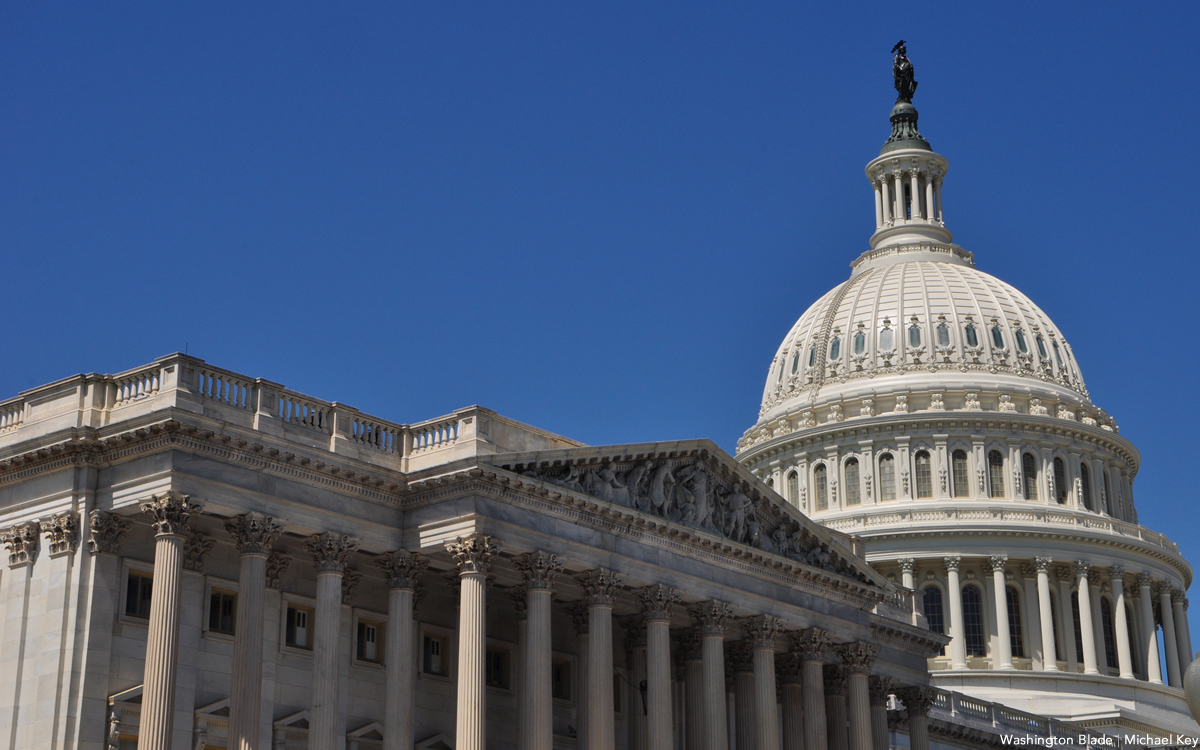
By Jennifer Shutt | WASHINGTON — U.S. House lawmakers will no longer be able to request earmarked funding for some nonprofits under a change in eligibility made by the Republican chairman of the Appropriations Committee on Thursday.
The alteration is related to an uproar during last year’s annual government funding process, when House Republicans, who are in the majority, included three LGBTQ projects in one of their spending bills and then stripped that funding during a tense public markup.
The change to eligibility in the House affects nonprofits that fall under the Economic Development Initiative account within the Transportation-HUD spending bill, one of the dozen funding bills that are written by congressional appropriators.
The new guidance laid out by Chairman Tom Cole doesn’t apply to House lawmakers seeking funding for nonprofits in the other accounts eligible for earmark requests.
It also doesn’t affect how the earmark process will work on the Senate side. That means there is another avenue for lawmakers to secure funding for LGBTQ projects if they decide to make those requests and the Senate spending panel chooses to include it in its version of the bill.
“Similar to previous reforms made in this Congress, this change aims to ensure projects are consistent with the community development goals of the federal program,” Cole wrote in a “Dear Colleague” letter.
Cole, an Oklahoma Republican, became chairman of the powerful spending panel earlier this month after the former chairwoman, Kay Granger of Texas, decided to leave that leadership post early.
Connecticut Democratic Rep. Rosa DeLauro, ranking member on the committee, released a written statement, saying the change “is a seismic shift, as nearly half of all the 2024 House-funded EDI projects were directed to non-profit recipients.”
“In order to accommodate the extreme Republican wing, Republicans are trying to root out any help for the LGBTQ+ community,” DeLauro wrote. “They are willing to hurt their own religious organizations, seniors, and veterans.”
The eligibility change, she wrote, would exclude House lawmakers from requesting funding for “YMCAs, Boys & Girls Clubs, and other groups vital to our communities.”
Three LGBTQ projects
House Republicans originally included $1.8 million in funding for the William Way LGBT Center in Philadelphia, $970,000 for the LGBT Center of Greater Reading’s Transitional Housing Program in Pennsylvania and $850,000 for affordable senior housing at LGBTQ Senior Housing, Inc. in Massachusetts in their Transportation-HUD spending bill released last summer.
All three projects were requested by House lawmakers, the first step in the earmark process.
The projects were funded under the Economic Development Initiatives account that at the time was eligible for earmarks in the Housing and Urban Development section of the Transportation-HUD spending bill.
Cole, then-chairman of that subcommittee, removed the three projects through a so-called manager’s amendment that made numerous changes to the bill during committee debate.
While manager’s amendments are standard and typically bipartisan, the removal infuriated Democrats on the committee, who urged their GOP colleagues to reconsider during a heated debate last July.
Wisconsin Democratic Rep. Mark Pocan said at the time removing the funding was an insult to LGBTQ Americans as well as their families and allies.
“The fact that you would take away members’ earmarks simply because they refer to the LGBTQI+ community is insane, is bigoted,” Pocan said in July.
The final batch of spending bills Congress approved in March, following House-Senate negotiations, was slated to include $1 million for the William Way LGBT Center in Philadelphia, since the Pennsylvania senators also requested funding. But that was removed from the bill after it had been released, setting off a confusing blame game among lawmakers.
The final Labor-HHS-Education spending bill approved in March included $850,000 for LGBTQ Senior Housing, Inc., MA, for services for older adults within the Administration for Community Living account within the HHS section of the bill.
That funding in Massachusetts had been stripped from the House’s Transportation-HUD bill by GOP lawmakers, but was also requested by the state’s two senators and included in the Labor-HHS-Education spending bill within that chamber.
That final spending bill also included $400,000 for the Garden State Equality Education Fund, Inc., for trauma-informed strategies to support LGBTQ+ youth in New Jersey, within the Innovation and Improvement account for the Department of Education.
That funding was never requested by House lawmakers, but was asked for by the state’s two senators.
*****************************************************************************************

Jennifer covers the nation’s capital as a senior reporter for States Newsroom. Her coverage areas include congressional policy, politics and legal challenges with a focus on health care, unemployment, housing and aid to families.
*****************************************************************************************
The preceding article was previously published by The DC Bureau of States Newsroom and is republished with permission.
States Newsroom is the nation’s largest state-focused nonprofit news organization.
Los Angeles
Ricky Martin will be the headliner for 2024 LA Pride in the Park
LA Pride in the Park will return to the Los Angeles State Historic Park on Saturday, June 8. Across 20 acres with a capacity for 25,000

By Paulo Murillo | LOS ANGELES – Ricky Martin is headlining LA Pride 2024 at Los Angeles State Historic Park. Christopher Street West Association (CSW) – the 501(c)3 nonprofit that has produced the iconic LA Pride celebration for more than 50 years – announced this week.
In a press release CSW stated that global icon Ricky Martin will headline LA Pride in the Park, with additional artists to be unveiled. As the first openly gay Latin artist to take center stage at the highly-anticipated Pride event of the year, this marks Martin’s first-ever headliner Pride performance.
LA Pride in the Park will return to the Los Angeles State Historic Park on Saturday, June 8. Across 20 acres and with a capacity for 25,000, LA Pride in the Park is one of the most sought-after and largest Official Pride concerts in the country. Additionally, the official theme for this year’s Pride season is “Power in Pride,” which celebrates the LGBTQIA+ community’s ability to live authentically.
General Admission and VIP Passes are now available to purchase at lapride.org.
“I am thrilled to be headlining LA Pride in the Park because it’s an incredible opportunity to celebrate love, diversity, and equality,” said Martin. “LA Pride is a testament to the power of community, the power of visibility, and the power of standing up for our rights. Being part of this vibrant community fills me with pride and purpose.”
“With his electrifying stage presence and chart-topping hits, Ricky Martin has long been an inspiration to millions around the world,” said Gerald Garth, board president of CSW/LA Pride. “His participation in LA Pride in the Park goes beyond mere entertainment; it symbolizes a powerful affirmation of queer Latin identity and a celebration of diversity within the LGBTQ+ community. We cannot wait to be ‘Livin’ La Vida Loca’ while beaming with Pride!”
Ricky Martin, a global music icon, is a multi-talented artist known for his accomplishments as a singer, songwriter, actor and author. He has won multiple GRAMMY® Awards and is considered one of the most influential superstars in history, often referred to as the “King of Latin Pop.” Throughout his nearly four-decade career, Martin brought Latin music and culture to the mainstream, paving the way for crossover talent.
Born in Puerto Rico, Martin gained fame as a member of the popular Latin American band Menudo before embarking on a successful solo career. Notably, he became the first Latin American male to star in a MAC Viva Glam Campaign, raising significant funds for HIV/AIDS research. With over 180 awards, including two GRAMMY® and four Latin GRAMMY® Awards, Martin made history and has been recognized as the youngest-ever “Person of the Year” by the Latin Recording Academy.
He is also an accomplished actor, earning an EMMY® nomination for his role in FX’s “The Assassination of Gianni Versace: American Crime Story” and displaying his talent on Broadway. He starred in “Jingle Jangle” for Netflix, opposite Forest Whitaker, Anika Noni Rose and Hugh Bonneville and can now be seen in the highly lauded Apple TV series “Palm Royale” alongside Laura Dern, Kristen Wiig, Allison Janney and Carol Burnett.
Beyond his artistic achievements, Martin is a dedicated philanthropist. He established the Ricky Martin Foundation, which actively fights against human trafficking and modern-day slavery. As a Global Ambassador for UNICEF, he has provided significant support to communities affected by natural disasters.
Martin has received numerous humanitarian awards, including the Hispanic Federation’s “Humanitarian Award” and the Human Rights Campaign’s “National Visibility Award.” In recognition of his contributions, the City of New York declared “Ricky Martin Day” to honor his artistic legacy and philanthropic work.
Information about parking, transportation, safety, security, medical support, participating vendors, and further programming will be available soon.
For sponsorship and other talent inquiries, contact LA Pride at [email protected]. For more information, follow @lapride on Facebook, Instagram, TikTok, and Twitter.
******************************************************************************************

Paulo Murillo is Editor in Chief and Publisher of WEHO TIMES. He brings over 20 years of experience as a columnist, reporter, and photo journalist. Murillo began his professional writing career as the author of “Love Ya, Mean It,” an irreverent and sometimes controversial West Hollywood lifestyle column for FAB! newspaper. His work has appeared in numerous print and online publications, which include the “Hot Topic” column in Frontiers magazine, where he covered breaking news and local events in West Hollywood. He can be reached at [email protected]
The preceding article was previously published at WeHo Times and is republished with permission.
Research/Study
Landmark systematic review of trans surgery
Landmark systematic review concluded regret rate for trans surgeries is “remarkably low,” compared to other surgeries & major life decisions

By Erin Reed | WASHINGTON – In recent years, anti-transgender activists have used fear of “regret” as justification to ban gender-affirming care for transgender youth and restrict it for many adults. Now, a new systematic review published in The American Journal of Surgery has concluded that the rate of regret for transgender surgeries is “remarkably low.”
The review encompasses more than 55 individual studies on regret to support its conclusions and will likely be a powerful tool in challenging transgender bans in the coming weeks.
The study, conducted by experts from the University of Wisconsin School of Medicine and Public Health, examines reported regret rates for dozens of surgeries as well as major life decisions and compares them to the regret rates for transgender surgeries.
It finds that “there is lower regret after [gender-affirming surgery], which is less than 1%, than after many other decisions, both surgical and otherwise.” It notes that surgeries such as tubal sterilization, assisted prostatectomy, body contouring, facial rejuvenation, and more all have regret rates more than 10 times as high as gender-affirming surgery.
You can see regret rates for many of the surgeries they examined in the review here:
The review also finds that regret rates for gender-affirming surgeries are lower than those for many life decisions. For instance, the survey found that marriage has a regret rate of 31%, having children has a regret rate of 13%, and at least 72% of sexually active students report regret after engaging in sexual activity at least once. All of these are notably magnitudes higher than gender affirming surgery.
Regret is commonly weaponized against transgender care. The recently released Cass Review, currently being used in an attempt to ban transgender care in England, mentions “regret” 20 times in the document. Pamela Paul’s story in The New York Times features stories of regret heavily and objects to reports of low regret rates. Legislators use the myth of high levels of regret to justify harsh crackdowns on transgender care.
Recently, though, anti-trans activists who have pushed the idea that regret may be high appear to be retreating from their claims. In the WPATH Files, a highly editorialized and error-filled document targeting the World Professional Association for Transgender Health, the authors state that the low levels of regret for transgender people obtaining surgery are actually cause for alarm, and that transgender people are “suspiciously” happy.
The idea that transgender people cannot be trusted to report their own happiness and regret has also been echoed by anti-transgender activists and influencers like Matt Walsh and Jesse Singal.
The review has sharp critiques for those who use claims of “regret” to justify bans on gender affirming care: “Unfortunately, some people seek to limit access to gender-affirming services, most vehemently gender-affirming surgery, and use postoperative regret as reason that care should be denied to all patients. This over-reaching approach erases patient autonomy and does not honor the careful consideration and multidisciplinary approach that goes into making the decision to pursue gender-affirming surgery… [other] operations, while associated with higher rates of post-operative regret, are not as restricted and policed like gender-affirming surgery.”
The review is in line with recent data supporting very low regret rates for transgender people. The 2022 U.S. Transgender Survey, the world’s largest survey of transgender individuals, which surveyed over 90,000 transgender people, found that for those receiving hormone therapy, regret rates are incredibly low: less than 1% report being a little or a lot less satisfied after beginning hormone therapy.
You can view a chart from the 2022 US Transgender Survey showing low rates of regret for hormone therapy here:
There is no evidence that transgender people experience high rates of regret for any transgender care, including transgender surgery. On the contrary, gender-affirming care saves lives.
A Cornell review of more than 51 studies found that gender-affirming care significantly improves the well-being of transgender individuals and also concluded that regret is rare. Low rates of regret for transgender people are not “suspicious.” Rather, they are evidence that the care transgender people seek is important, carefully provided, and helps them live more fulfilled lives.
****************************************************************************

Erin Reed is a transgender woman (she/her pronouns) and researcher who tracks anti-LGBTQ+ legislation around the world and helps people become better advocates for their queer family, friends, colleagues, and community. Reed also is a social media consultant and public speaker.
******************************************************************************************
The preceding article was first published at Erin In The Morning and is republished with permission.
Alabama
Alabama lawmakers pass bill may lead to prosecutions of librarians
“This would open librarians and their staff in our most vulnerable libraries to criminal prosecution for books housed in the adult section”
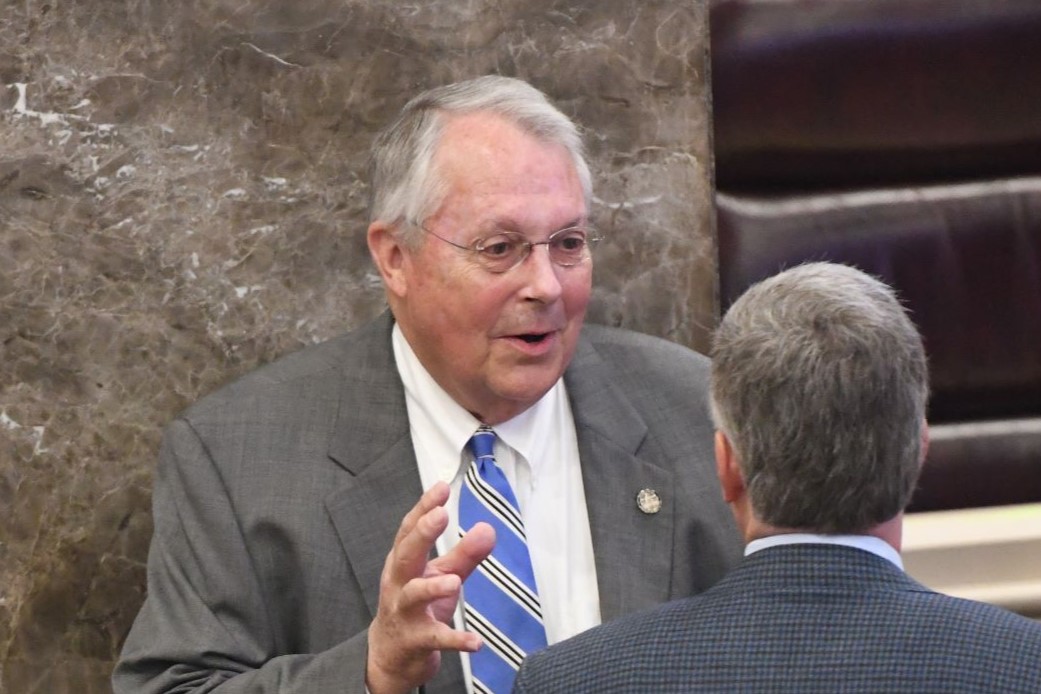
By Alander Rocha | MONTGOMERY, Ala. – The Alabama House of Representatives Thursday passed a bill that could lead to the arrest of librarians if a person accuses them of distributing obscene or harmful materials to minors or exposes them to people dressed in revealing clothing.
HB 385, sponsored by Rep. Arnold Mooney, R-Indian Springs, also expands the term “sexual conduct” in state law to include conduct that “knowingly exposes minors to persons who are dressed in sexually revealing, exaggerated, or provocative clothing or costumes, or are stripping, or engaged in lewd and lascivious dancing, presentations, or activities in K-12 public schools, public libraries, and other public places where minors are expected and are known to be present without parental consent.”
“The thing that I would like to point out is, this is an effort to protect children,” Mooney said. “It is not a Democrat bill. It’s not a Republican bill. It’s a people bill to try to protect children.”
The bill passed 72-28 along party line votes. A message seeking comment was left with the Alabama Library Association.
The legislation comes amid right-wing attacks on the content and leadership of libraries in Alabama and around the country, mostly around books with LGBTQ+ characters or themes. Mooney introduced a similar bill last year that explicitly banned drag show performances where children were present. The bill did not become law.
The bill as filed could have subjected librarians to a Class C felony, punishable by up to 10 years in prison, on a second or subsequent violation. A first offense would have been a misdemeanor, with a fine up to $10,000 and county jail or sentenced to hard labor for the county for not more than one year.

Rep. David Faulkner, R-Mountain Brook, offered an substitute to the bill he said was to “tighten up” the original bill and downgraded the criminal charges to a Class C misdemeanor, up to three months in jail or a $500 fine, for the first offense; a second offense would warrant a Class B misdemeanors, punishable by up to six months in jail; and a Class A misdemeanor, punishable by up to a year in jail, for the third and subsequent offense.
The substitute also provided notice requirements for those accused of misdemeanor, allowing up to seven days for materials to be removed. It also replaced the term “material” for “conduct” in the “sexual conduct” definition. The bill previously defined sexual conduct as any “sexual or gender oriented material that knowingly exposes minors.”
“We wanted to make sure that people were protected, our librarians were protected, that our K through 12 officials were protected, and that’s what we’ve tried to do in the sub, is strengthen that protection,” Faulkner said.

Democrats, however, said that the changes actually made it easier to subject librarians to criminal prosecution. Rep. Chris England, D-Tuscaloosa, said that lawmakers need to have “an actual class on what criminal law does, what intent is and the process.”
By reducing the felony charges to misdemeanors, England said, the bill would make it easier for librarians to be arrested via a warrant. A warrant clerk can sign a warrant “on the spot right there” without proper due process.
“In a situation where you have to have a warrant — that’s for felonies — it actually has to be investigated,” England said.
He said that the bill only requires district attorneys get notice, and there is no standard for what the notice is supposed to say, or requirement that the district attorney acknowledge the notice.
“This basically gives one person the ability to have a librarian arrested, as long as they can convince a warrant clerk that they’ve given notice and material is obscene. Does that make you comfortable?” England asked.
Rep. Neil Rafferty, D-Birmingham, said he was concerned that people will abuse the definitions provided in the bill and asked if there would be an appeals process in case a person is harassed based on the bill’s language.
“I’m talking about people abusing this definition that we have in here in order to target and harass people, who might be dressed up for a Halloween costume, or dressed up, like I said, in just the warmer months, wearing a sundress,” Rafferty said.
Faulkner maintained that there would still be seven days for the person to remove or change material or conduct in question. Rafferty questioned whether it is a good idea to bring people into the criminal justice system to resolve civil matters.
“I do still have some serious problems with this because I feel like this is a violation of First Amendment, I feel like is easily going to be abused, and we will be dealing with unintended consequences of it,” Rafferty said.
Rep. Danny Garrett, R-Trussville, said the bill was needed because “we woke up one day and things changed.”
Garrett cited the American Library Association adopting a user privacy policy stating children and young adults have the “right to receive information through the library in print, sound, images, data, social media, online applications, games, technologies, programming, and other formats.”
“I haven’t talked to anybody and anybody who believes that, but that was the national policy, and that began to drive a lot of things that just popped up that people didn’t understand. I don’t think the local libraries necessarily embraced that, but it just happens,” Garrett said.
Rep. A.J. McCampbell, D-Linden, said that while they may not want children to be exposed to the material in question, the “real world is full of a whole lot of stuff that we don’t want our children exposed to.” He said that he was exposed to a lot growing up, and the things he learned that was “lewd and not right” were not learned in a library.
“When we are trying to dictate by precluding what a person may learn about, then we limit their ability to operate in a society they actually live in,” McCampbell said.
Read Freely Alabama, an volunteer group opposing censorship in local libraries, said in a statement that even with the changes, the bill still “criminalizes normal library practices and subverts already established reconsideration procedures,” even after changes. The group said the bill would allow anyone to make a claim based on subjective personal beliefs.
“This would open librarians and their staff in our most vulnerable libraries to criminal prosecution for books housed in the adult section, giving them 7 days to ban these books from their libraries or be charged,” the statement read.
Craig Scott, president of the Alabama Library Association, said in a statement that despite the changes, librarians could still be penalized or arrested by “prosecutors eager to follow the demands of Alabama Republican Chair John Wahl, an Alabama Public Library Service Board member, who’s willing to jail librarians for having books he considers unacceptable.”
“This bill is government overreach, robs parents of their rights, and would have a chilling effect on free speech by potentially incarcerating librarians because particular books are available, including even the Bible,” Scott wrote.
The bill moves to the Senate for consideration.
******************************************************************************************

Alander Rocha is a journalist based in Montgomery, and he reports on government, policy and healthcare. He previously worked for KFF Health News and the Red & Black, Georgia’s student newspaper. He is a Tulane and Georgia alumnus with a two-year stint in the U.S. Peace Corps.
******************************************************************************************
The preceding article was previously published by the Alabama Reflector and is republished with permission.
The Alabama Reflector is an independent, nonprofit news outlet dedicated to covering state government and politics in the state of Alabama. Through daily coverage and investigative journalism, The Reflector covers decision makers in Montgomery; the issues affecting Alabamians, and potential ways to move our state forward.
We’re part of States Newsroom, the nation’s largest state-focused nonprofit news organization.

MEXICO CITY — The Mexican Senate on Thursday approved a bill that would ban so-called conversion therapy in the country.
Yaaj México, a Mexican LGBTQ+ rights group, on X noted the measure passed by a 77-4 vote margin with 15 abstentions. The Chamber of Deputies, the lower house of Mexico’s congress, approved the bill last month that, among other things, would subject conversion therapy practitioners to between two and six years in prison and fines.
The Senate on its X account described conversion therapy as “practices that have incentivized the violation of human rights of the LGBTTTIQ+ community.”
“The Senate moved (to) sanction therapies that impede or annul a person’s orientation or gender identity,” it said. “There are aggravating factors when the practices are done to minors, older adults and people with disabilities.”
Mexico City and the states of Oaxaca, Quintana Roo, Jalisco and Sonora are among the Mexican jurisdictions that have banned the discredited practice.
The Senate in 2022 passed a conversion therapy ban bill, but the House of Deputies did not approve it. It is not immediately clear whether President Andrés Manuel López Obrador supports the ban.
Canada, Brazil, Belgium, Germany, France, and New Zealand are among the countries that ban conversion therapy. Virginia, California, and D.C. are among the U.S. jurisdictions that prohibit the practice for minors.
Colorado
Colorado’s high court okays anti-trans ballot initiative effort
Colorado Supreme Court greenlights signature collection for ballot initiative opponents believe would target LGBTQ+ students
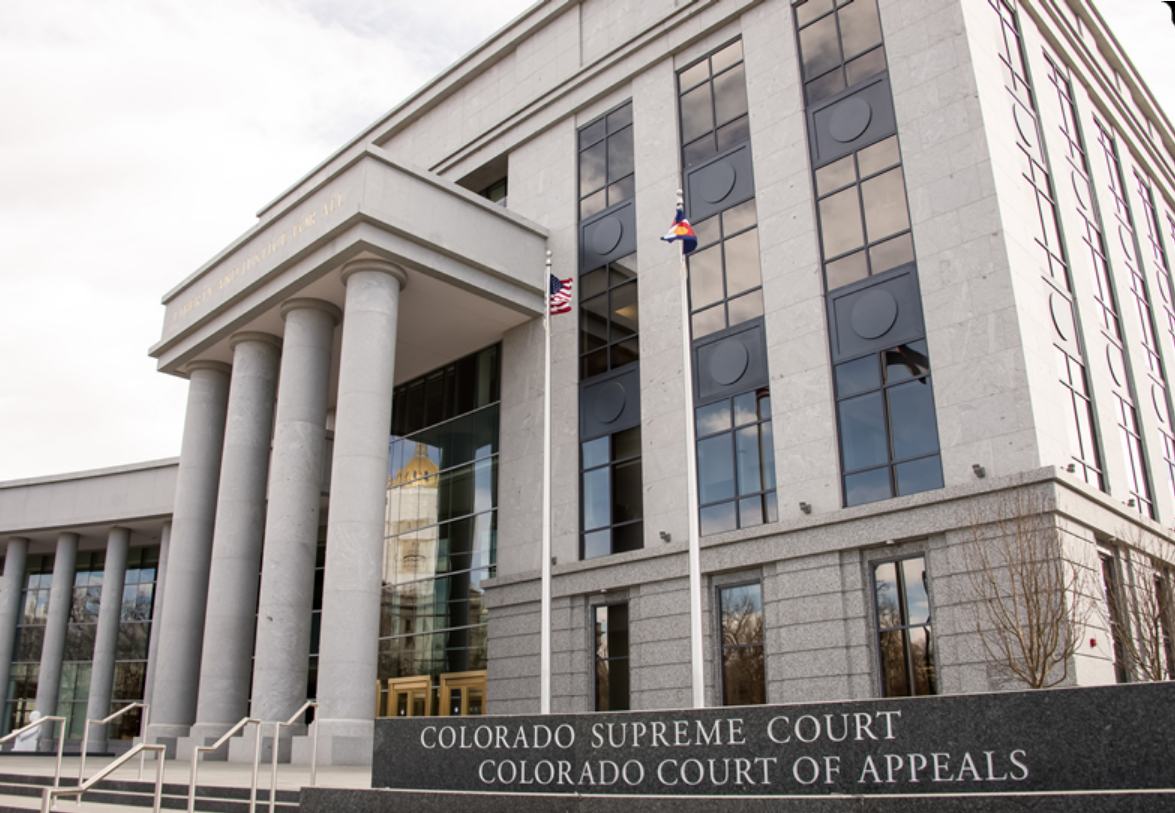
DENVER, Colo. – A conservative group that bills itself as defending parental rights has received approval to collect signatures for a ballot initiative that would forcibly out transgender students in the state’s schools.
“We believe this measure is so supportive of our kiddos that do identify as LGBT,” Lori Gimelshteyn, executive director of the Colorado Parent Advocacy Network, told Denver’s NBC News affiliate KUSA 9 news. Gimelshteyn helped write the ballot initiative.
“We very strongly believe that parents are the ones that know best and help them,” she said.
According to KUSA, the measure was approved by the Colorado Title Board, but opponents including LGBTQ advocacy group One Colorado and Out Boulder County, challenged the decision with the Colorado Supreme Court. Late last week, the court affirmed the initiative, giving it the go-ahead to begin collecting signatures.
The exact text of the ballot measure states, “Any public school representative who obtains information that a child enrolled in their public school is experiencing gender incongruence shall notify the child’s parents within 48 hours of receiving such information.”
In a statement to the Blade Thursday, the executive director of Out Boulder County, Mardi Moore reacted noting that the Colorado Supreme Court decision “to allow the collection of signatures to place a measure on our November 2024 ballots that is an attack on our teachers, students, and families.”
“Today is a sad day in Colorado. Despite our state’s long history of honoring individual rights and freedoms, the Supreme Court has ruled that a vocal minority can begin collecting signatures from Coloradans to codify government overreach in our schools, communities, and lives. If successful, their efforts will place an additional administrative burden on our already-overworked teachers and school administrators and expose them to frivolous and costly lawsuits.
“The proponents of this measure do not understand Colorado’s values. And they do not care about the other consequences this ballot measure will have on teachers, kids, and families. You will hear several things about the measure they are gathering signatures for to put on our election ballot – that they want to protect kids, that it will only affect one part of the LGBTQ+ community – but they are lying to you.
“Out Boulder County will do everything in our power to ensure our teachers, kids, and families can be who they are and feel safe in schools.”
KUSA 9 News also reported that the Colorado Parent Advocacy Network has until August to collect about 125,000 signatures to get the measure on the ballot.
“You can be ensured that our volunteers, our staff and our large community will do everything possible to ensure this is not passed in the state of Colorado,” Out Boulder County‘s Moore told KUSA. “We’ve had big wins. I don’t think Colorado will be any different.”
Colorado Parent Advocacy Network’s Gimelshteyn hopes to start collecting signatures on this measure by the end of this week. She told KUSA every local school district will have the ability to write a policy around how this measure will be implemented, if it does get on the ballot and pass.
Other Anti-LGBTQ measures
The Colorado Parent Advocacy Network effort is only one of several ballot initiatives targeting Colorado’s LGBTQ+ community. The Colorado Newsline reported two measures sponsored by Erin Lee, a Fort Collins anti-LGBTQ activist who since 2022 has made a string of appearances in conservative media crusading against what she calls the “indoctrination” of children by “predators” at public schools, have been approved by the Title Board. One would require Colorado public schools to notify parents when their child shows signs of “experiencing gender incongruence” at school, and another would codify a parent’s “legal right to review their child’s school records.”
Lee, her husband and two other parents sued the Poudre School District in federal court last year, alleging that her daughter’s experience with an after-school Genders and Sexualities Alliance club, which “introduced concepts of gender fluidity and various types of sexual attraction,” violated their constitutional rights as parents. Their characterization of some of the club’s discussions and materials has been disputed, and their lawsuit was dismissed.
Another set of ballot measures targeting transgender Coloradans has attracted high-profile support from prominent Republican politicians. One would prohibit transgender athletes from competing in “a sport or athletic event designated as being for females, women or girls.” The other proposes a sweeping ban on medical procedures and hormone treatments for transgender people under the age of 18.

The Title Board, however, ruled that both measures violate the single-subject rule, and upheld their decisions again last week, prompting criticism from Greg Lopez, the GOP’s nominee for a 4th Congressional District special election in June, and former state Sen. Kevin Lundberg.
“I believe it is doing a great disservice to we the people in Colorado, who reserve the right to make law independent of the General Assembly,” Lundberg said. “I’m saying this to you very directly, because I guarantee I’m going to say this publicly — you need to know that if … you’re going to say this is not a single subject, that’s a violation of our Constitution.”
Hearings on the anti-transgender initiatives have been marked by unusually tense scenes at the normally tranquil Title Board, including a session last month during which supporters of the initiatives shouted at board members while filming the hearing with their phones. Conley, the board chair, told Lundberg that his comments about speaking “publicly” were part of a pattern she found “unnerving.”
“We have put in a tremendous amount of effort, we are doing our best, we are seeking to be consistent. I am constantly concerned about being doxxed online,” Conley said. “People can always comment on public processes. It is in the news all the time. But to be reminded and directed at it, I can’t help but think that there’s a little bit of a hidden message there that is not appreciated and won’t be tolerated.”
Additional reporting by Chase Woodruff, the Colorado Newsline.
Minnesota
DA: Teen charged in fatal anti-LGBTQ Minneapolis mass shooting
The charged individual was 17 years old at the time of the shooting, in which one person was killed & seven others were injured by gunfire
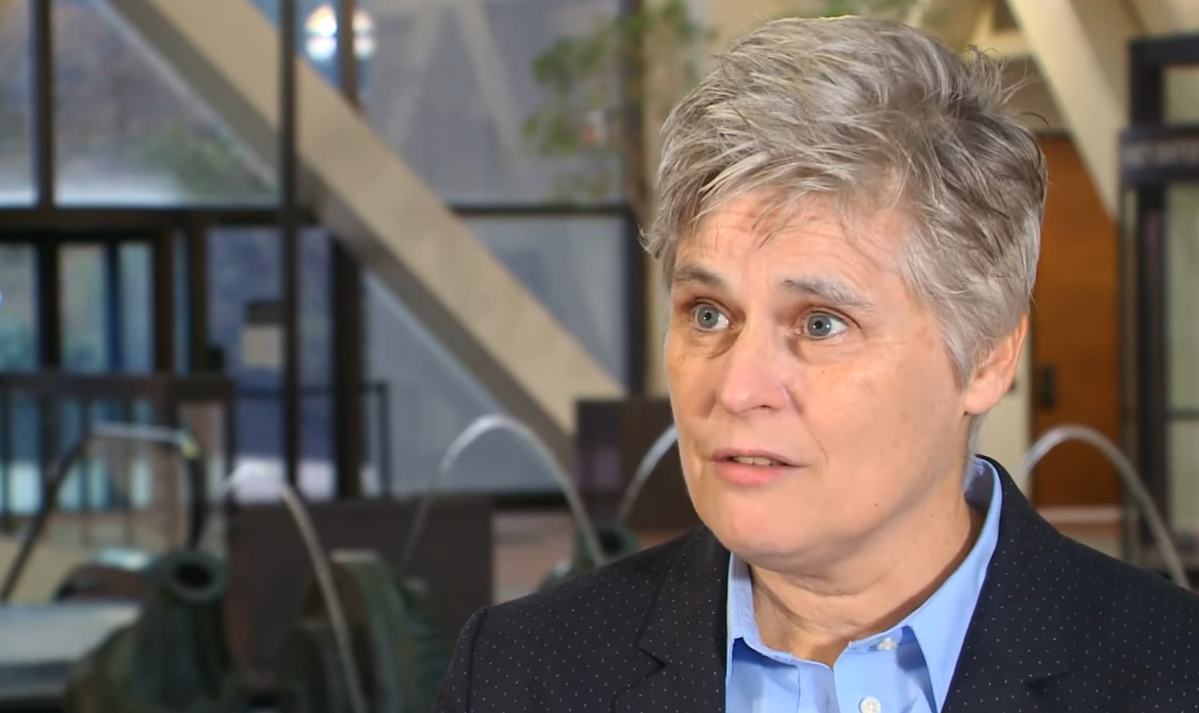
MINNEAPOLIS, Minn. – Hennepin County Attorney Mary Moriarty today announced that her office has charged a now-18 year old with murder in the August 2023 mass shooting at a Minneapolis backyard concert venue known as “Nudieland” that was attended by many members of the LGBTQ+ community.
The charged individual was 17 years old at the time of the shooting, in which one person was killed and at least seven others were injured by gunfire. The document charging Dominic James Burris and another man says the shooting was motivated by bias against the victims’ gender, sexual orientation, gender identity and gender expression.
The office charged the individual by sealed warrant on Friday, April 12. The complaint was sealed because the individual was not in custody at the time of charging. Police arrested the individual, currently age 18, last night, and he made his first appearance in juvenile court today. The Hennepin County Attorney’s Office will decide whether to pursue adult certification of the case or keep it in juvenile court after certification studies are completed.
“Gun violence will not be tolerated in our communities,” Hennepin County Attorney Mary Moriarty said. “This shooting, at what should have been a joyous event, rocked our LBGTQIA+ community, and increased fear among a community that is too often already under attack. We are committed to holding those who caused this harm accountable, and to offering, as we already have, our office’s resources to those who have been impacted by this senseless violence.”
The charges revealed today come after an investigation by the Minneapolis Police Department and the Hennepin County Attorney’s Office. The two offices collaborated since this tragic shooting to review evidence and prepare the cases for charging.
“The identification of those believed to be responsible for the terrible events of August 11th is the culmination of the careful, steadfast, and meticulous collaboration between MPD investigators, forensic scientists, federal partners, and prosecutors,” said Minneapolis Police Chief Brian O’Hara. “The violence inflicted in this mass shooting angers me, and I am moved to compassion for those who were impacted by this terrible murder and attempted murders. I am proud of the dedicated members of the MPD who continue to serve above and beyond for the victims of crime.”
The allegations detailed in the criminal complaint include:
Two males interacted with multiple people at the concert in the minutes before the shooting. Witnesses stated that the two males approached them and then made insensitive comments during an interaction characterized as “hostile” where the two men brandished firearms.
Other witnesses reported they overheard the respondents utter derogatory epithets about the sexual orientation of concert attendees.
Both suspects remained at the concert following the interaction before leaving together.
According to witnesses, the shooting began less than a minute after they left, coming from a yard next door. Both the location and number of bullet casings corroborated descriptions of where the victims and witnesses observed the suspects.
Upon arriving at the scene, officers encountered at least seven victims who had suffered gunshot wounds. One victim suffered a gunshot wound to his back and died shortly after law enforcement arrived.
Forensic examiners developed a DNA profile from a cigarette butt at the scene, which matched a known DNA profile of one of the suspects.
Investigators located surveillance videos from around the time and location of the shooting, confirming that two males matching the physical appearance of the suspects walked toward the direction of the party shortly before the shooting took place. A witness later identified the second suspect in the surveillance video.
Politics
Four states to ignore new Title IX rules protecting trans students
Republican officials in Oklahoma, Louisiana, Florida, and South Carolina have directed schools to ignore new Title IX rules
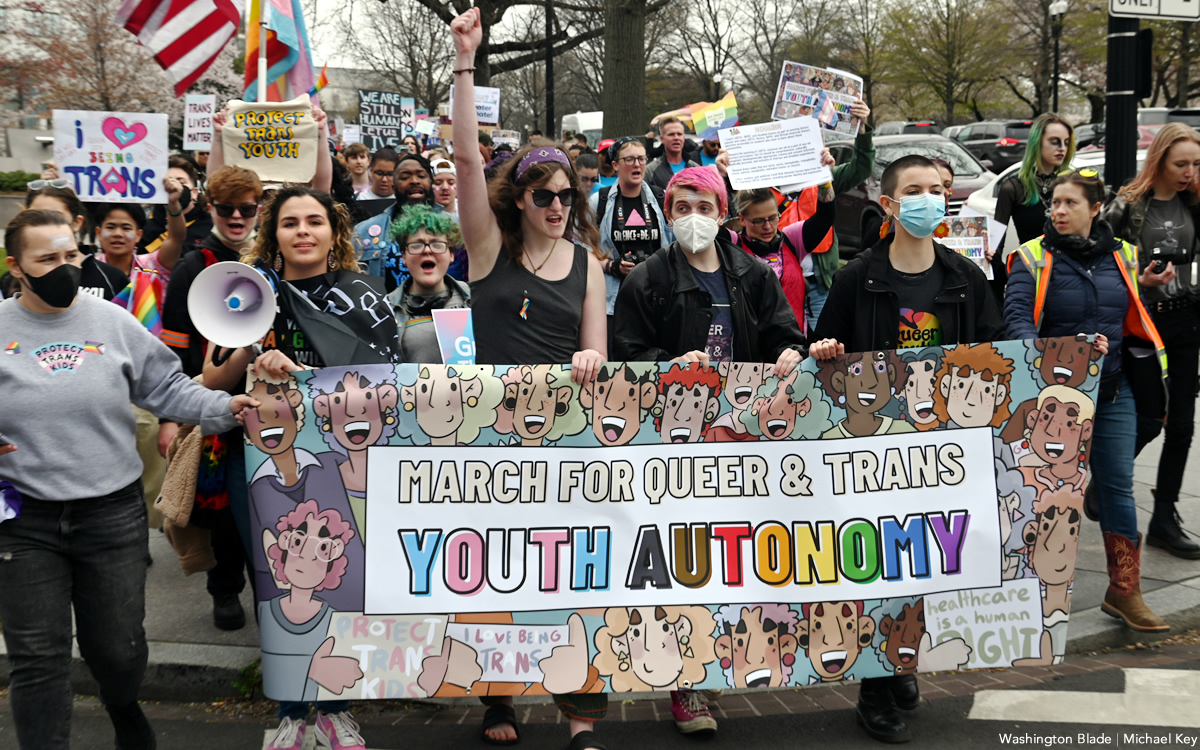
By Erin Reed | WASHINGTON – Last Friday, the Biden administration released its final Title IX rules, which include protections for LGBTQ+ students by clarifying that Title IX forbids discrimination based on sexual orientation and gender identity.
The rule change could have a significant impact as it would supersede bathroom bans and other discriminatory policies that have become increasingly common in Republican states within the United States.
As of Thursday morning, however, officials in at least four states — Oklahoma, Louisiana, Florida, and South Carolina — have directed schools to ignore the regulations, potentially setting up a federal showdown that may ultimately end up in a protracted court battle in the lead-up to the 2024 elections.
Louisiana State Superintendent of Education Cade Brumley was the first to respond, decrying the fact that the new Title IX regulations could block teachers and other students from exercising what has been dubbed by some a “right to bully” transgender students by using their old names and pronouns intentionally.
Asserting that Title IX law does not protect trans and queer students, Brumley states that schools “should not alter policies or procedures at this time.” Critically, several courts have ruled that trans and queer students are protected by Title IX, including the 4th US Circuit Court of Appeals in a recent case in West Virginia.
In South Carolina, Schools Superintendent Ellen Weaver wrote in a letter that providing protections for transgender and LGBTQ+ students under Title IX “would rescind 50 years of progress & equality of opportunity by putting girls and women at a disadvantage in the educational arena,” apparently leaving transgender kids out of her definition of those who deserve progress and equality of opportunity.
She then directed schools to ignore the new directive while waiting for court challenges. While South Carolina does not have a bathroom ban or statewide Don’t Say Gay or Trans law, such bills continue to be proposed in the state.
Responding to the South Carolina letter, Chase Glenn of Alliance For Full Acceptance stated, “While Superintendent Weaver may not personally support the rights of LGBTQ+ students, she has the responsibility as the top school leader in our state to ensure that all students have equal rights and protections, and a safe place to learn and be themselves. The flagrant disregard shown for the Title IX rule tells me that our superintendent unfortunately does not have the best interests of all students in mind.”
Florida Commissioner of Education Manny Diaz also joined in in instructing schools not to implement Title IX regulations. In a letter issued to area schools, Diaz stated that the new Title IX regulations were tantamount to “gaslighting the country into believing that biological sex no longer has any meaning.”
Governor Ron DeSantis approved of the letter and stated that Florida “will not comply.” Florida has notably been the site of some of the most viciously anti-queer and anti-trans legislation in recent history, including a Don’t Say Gay or Trans law that was used to force a trans female teacher to go by “Mr.”
State Education Superintendent Ryan Walters of Oklahoma was the latest to echo similar sentiments. Walters has recently appointed the right-wing media figure Chaya Raichik of Libs of TikTok to an advisory role “to improve school safety,” and notably, Chaya Raichik has posed proudly with papers accusing her of instigating bomb threats with her incendiary posts about LGBTQ+ people in classrooms.
The Title IX policies have been universally applauded by large LGBTQ+ rights organizations in the United States. Lambda Legal, a key figure in fighting anti-LGBTQ+ legislation nationwide, said that the regulations “clearly cover LGBTQ+ students, as well as survivors and pregnant and parenting students across race and gender identity.” The Human Rights Campaign also praised the rule, stating, “rule will be life-changing for so many LGBTQ+ youth and help ensure LGBTQ+ students can receive the same educational experience as their peers: going to dances, safely using the restroom, and writing stories that tell the truth about their own lives.”
The rule is slated to go into effect August 1st, pending any legal challenges.
****************************************************************************

Erin Reed is a transgender woman (she/her pronouns) and researcher who tracks anti-LGBTQ+ legislation around the world and helps people become better advocates for their queer family, friends, colleagues, and community. Reed also is a social media consultant and public speaker.
******************************************************************************************
The preceding article was first published at Erin In The Morning and is republished with permission.
-

 Tennessee2 days ago
Tennessee2 days agoTennessee: Anti-LGBTQ parents can now foster, adopt LGBTQ kids
-

 Ventura County3 days ago
Ventura County3 days ago“Queers in the Valley” Ojai launches & is ready to celebrate Pride
-

 Research/Study3 days ago
Research/Study3 days ago90 percent of trans youth live in states restricting their rights
-

 California Politics3 days ago
California Politics3 days agoRecognizing & celebrating lesbians: Mayor Pro-Tem of El Cerrito
-

 Politics5 days ago
Politics5 days ago600+ national polls shows Biden & Trump are tied
-

 Politics4 days ago
Politics4 days agoSmithsonian staff concerned about future of LGBTQ programming
-

 Music & Concerts4 days ago
Music & Concerts4 days agoHere is the Earth Day anthem we forgot we needed
-

 Maine3 days ago
Maine3 days agoMaine’s Governor Mills signs trans & abortion sanctuary bill into law
-

 Florida4 days ago
Florida4 days agoGov. DeSantis denounces ‘weaponization’ of book challenges
-

 Political commentary & analysis4 days ago
Political commentary & analysis4 days ago20 bills die as Iowa Legislature adjourns-attacks on LGBTQ+ fail
















